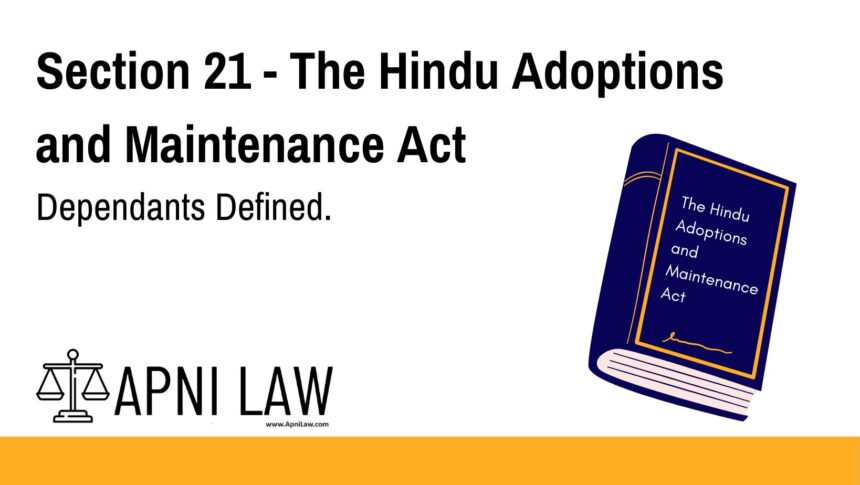Code: Section 21 – Dependants Defined
For the purposes of this Chapter, “dependants” mean the following relatives of the deceased:
(i) His or her father;
(ii) His or her mother;
(iii) His widow, so long as she does not re-marry;
(iv) His or her son, or the son of his predeceased son, or the son of a predeceased son of his predeceased son, so long as he is a minor:
Provided and to the extent that he is unable to obtain maintenance:
– in the case of a grandson, from his father’s or mother’s estate;
– in the case of a great-grandson, from the estate of his father or mother or father’s father or father’s mother.
(v) His or her unmarried daughter, or the unmarried daughter of his predeceased son, or the unmarried daughter of a predeceased son of his predeceased son, so long as she remains unmarried:
Provided and to the extent that she is unable to obtain maintenance:
– in the case of a granddaughter, from her father’s or mother’s estate;
– in the case of a great-granddaughter, from the estate of her father or mother or father’s father or father’s mother.
(vi) His widowed daughter:
Provided and to the extent that she is unable to obtain maintenance—
(a) from the estate of her husband; or
(b) from her son or daughter, if any, or his or her estate; or
(c) from her father-in-law or his father or the estate of either of them.
(vii) Any widow of his son or of a son of his predeceased son, so long as she does not re-marry:
Provided and to the extent that she is unable to obtain maintenance:
– from her husband’s estate; or
– from her son or daughter, if any, or his or her estate;
– or in the case of a grandson’s widow, also from her father-in-law’s estate.
(viii) His or her minor illegitimate son, so long as he remains a minor;
(ix) His or her illegitimate daughter, so long as she remains unmarried.
Explanation of Section 21 of The Hindu Adoptions and Maintenance Act
Section 21 defines the term “dependants” for the purpose of claiming maintenance under the Hindu Adoptions and Maintenance Act, 1956. This section is crucial because only those defined as “dependants” are legally entitled to claim maintenance from the estate of a deceased Hindu.
The provision ensures social welfare by identifying a specific and extended list of family members who are entitled to seek maintenance. The definition includes not just immediate family like parents, spouse, and children, but also extends to grandchildren, great-grandchildren, and certain categories of widows and illegitimate children—provided they meet specified conditions like being a minor, unmarried, or unable to maintain themselves.
Illustration
Example 1: Minor Grandson Seeking Maintenance
A man passes away and his minor grandson (son of his predeceased son) seeks maintenance. Since the grandson qualifies as a dependant under clause (iv) of Section 21, and he cannot obtain maintenance from his father or mother’s estate, he can claim it from the deceased’s estate.
Example 2: Widowed Daughter With No Support
A widowed daughter of the deceased is not receiving support from her husband’s estate or her children. Under clause (vi), she qualifies as a dependant and can claim maintenance from her father’s estate.
Common Questions and Answers
1. Who is considered a dependant under Section 21?
A dependant includes specified relatives of the deceased such as parents, widow, minor children, widowed daughter, widows of sons, and certain illegitimate children—subject to certain conditions.
2. Can illegitimate children claim maintenance?
Yes. A minor illegitimate son and an unmarried illegitimate daughter are considered dependants and can claim maintenance under Section 21.
3. Is a widow still a dependant if she remarries?
No. Once a widow remarries, she ceases to be a dependant under this section.
4. Can a great-grandchild claim maintenance?
Yes, but only if they are minors and cannot receive maintenance from their closer relatives’ estates (parents or grandparents as outlined in clauses iv and v).
5. Is the ability to claim maintenance automatic?
No. A dependant must show that they are unable to obtain maintenance from other available sources before claiming from the deceased’s estate.
Conclusion
Section 21 of the Hindu Adoptions and Maintenance Act, 1956 plays a foundational role in determining who qualifies as a “dependant” eligible for maintenance from the estate of a deceased Hindu. It embodies the spirit of familial responsibility and support across generations. This section ensures that no qualified family member is left without financial assistance, especially in the absence of a breadwinner.
For more legal insights and detailed analysis of Indian family laws, visit ApniLaw today.







